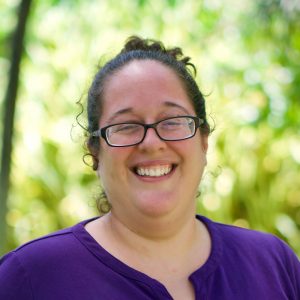Leah Muccio

"Modeling is essential. It is all about ‘walking the walk.’"
Hometown
Fairfax, Virginia, a suburb of Washington, DC
Department
School of Teacher Education - Elementary
What is your philosophy of teaching?
My general philosophy of teaching, especially in teacher education, is to make the gap between what I’m telling students to do and what I myself am doing as small as possible. I think the modeling is essential. It is all about ‘walking the walk’ if I’m ‘talking the talk.’ So if I’m telling students that it will be important to differentiate their instruction to meet a range of learner needs, I need to do that too. If I’m telling students that ‘hands on, minds on’ learning promotes student engagement and growth, I need to offer those learning opportunities. Above all, I aspire for joyful teaching and learning to be at the heart of what I do as a teacher. As Steve Wolk said, “By helping students find the pleasure in learning, we can make that learning infinitely more successful.” To me student enjoyment isn’t ancillary to teaching; it is at its core.
What are the keys to being a good teacher?
I think there are two keys to being a good teacher, reflection and relationships. Reflection, carefully considering both small and big picture aspects of my practice, helps me to grow and change and work toward meeting students’ needs more effectively. Thinking critically about both the things I would change about what I did in class yesterday and my role in the larger field of early childhood education enables me to strive to be better and be a lifelong learner. Along with reflection, relationships, being able to authentically connect with students, colleagues, children, and teachers provide the foundation for all of the teaching and learning that I do. I learn and grow through reflection, and I am able to do that collaboratively through relationships.
Describe your road to becoming an educator?
My road to becoming an educator began as a student with disabilities. With some teachers, I was given the support I needed to do things a little differently and still be successful in the classroom. With other teachers, the demand to do the same things as all the other students, the lack of adaptations to meet my individual needs, made learning and life in the classroom very challenging for me. Some of my school years were tough for me, and when I began to reflect on my experiences as a learner, I realized that it didn’t have to be that way. I think I became a teacher of young children so that all students, but especially those who learned a little differently, or just needed a little more support, could be happy and successful in the classroom. As I transitioned from teaching in PK-3 settings to working in teacher education, I kept this desire to promote access and equity for all children at the center of my teaching and research.
How do you hope to see your teaching and research benefit others?
I consider myself to be incredibly fortunate to have this opportunity in higher education. I also think of it as an important responsibility to positively contribute to early childhood education through this position. I hope that my research and teaching will promote more opportunities for all children, especially culturally, linguistically, and ability diverse children to be happy and successful in school and for us to keep asking more questions about ways that young children and teachers can engage in meaningful, joyful learning.
